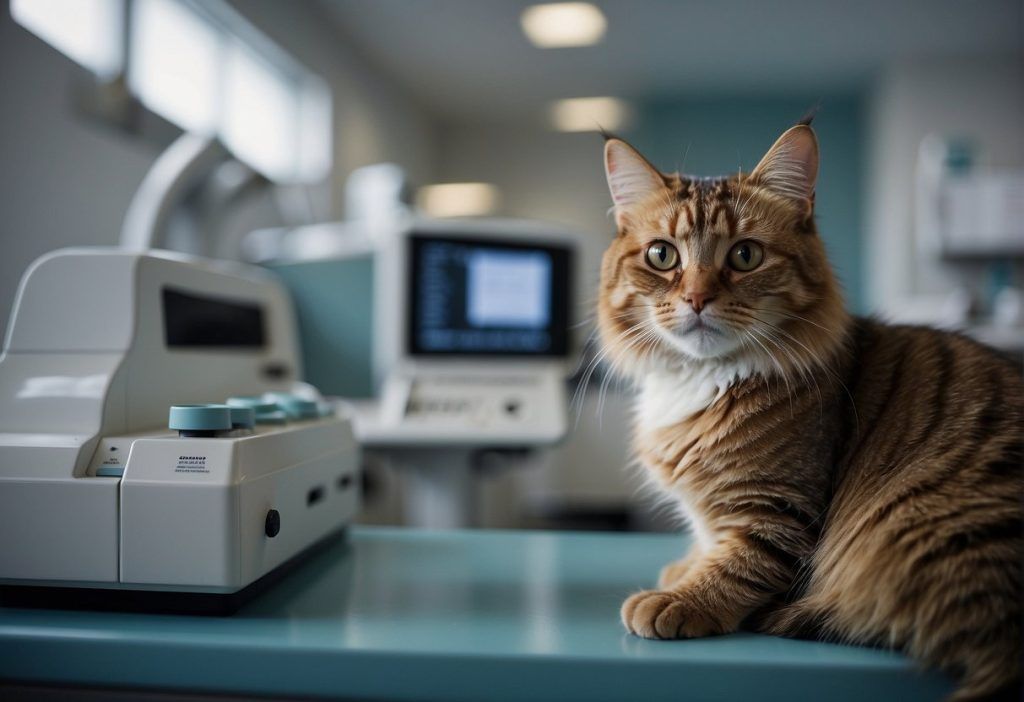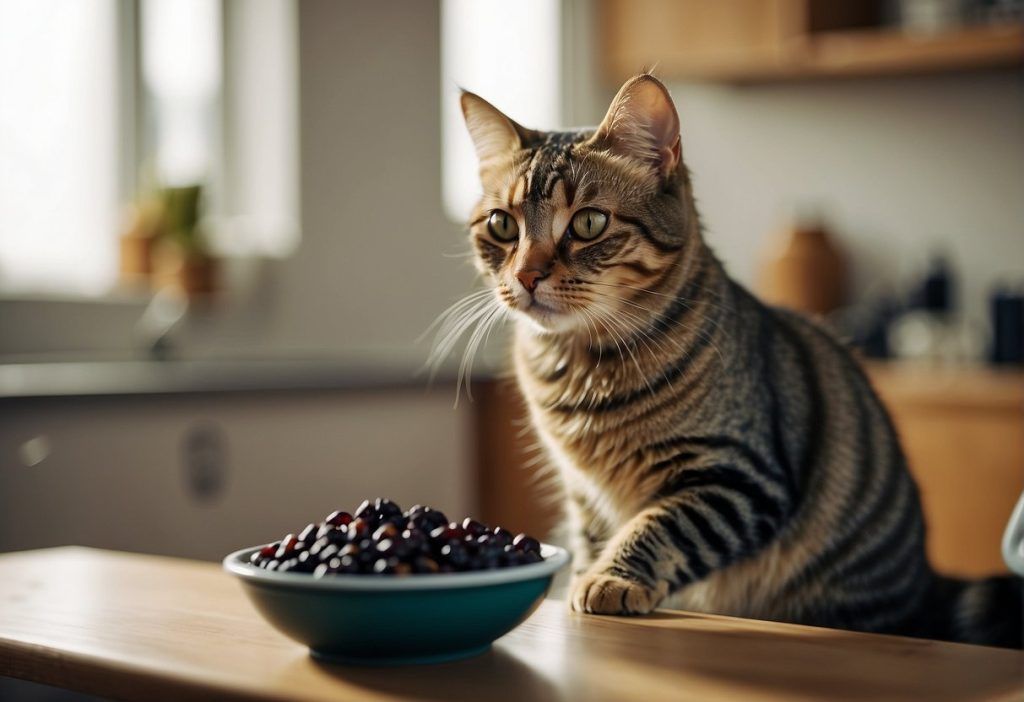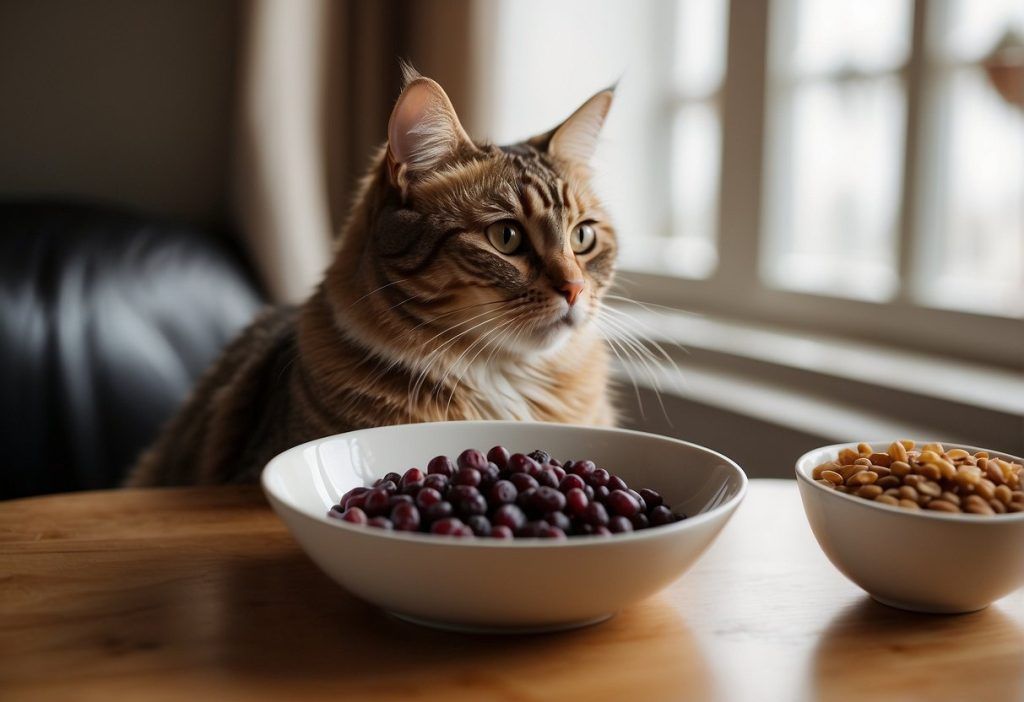Can cats eat raisins? Can your cat have a taste of human food?
Despite the cat’s natural curiosity and the occasional beggar’s gaze, raisins are a serious no for cats. Not just because they might not appreciate the taste, but because these dried grapes can be toxic to them.
Then how about other berries? Is it toxic to them? You can find it here.
Curiosity might have killed the cat, but it is our responsibility to protect our furry friends from their adventurous spirits.
For example, have you ever found your cat eyeing the snacks on your table and wondered if a little nibble could hurt? If you’ve got raisins on that plate, then it’s a firm no-go for kitty.
Why?
If you remember only one thing from our chat today, let it be that raisins can cause kidney issues in cats.
While not every cat will have the same reaction, and some may seem unaffected, it’s not worth the risk.
The symptoms of raisin toxicity can escalate quickly, within 24 hours, leading from mere weakness and dehydration to potential kidney failure.
Quick! Hide those raisins and let’s protect our whiskered friends by giving them cat-safe treats only.
Key Takeaways
- Raisins are one of toxic food to cats and can cause serious health issues.
- Symptoms of toxicity can develop rapidly and may lead to kidney failure.
- Preventive care includes keeping raisins out of reach and consulting a vet if exposure occurs.
Can Cats Eat Raisins? Detailed Analysis of Raisin Poisoning in Cats
Why Raisins are Harmful to Cats
Ever wondered if that little dried grape, known as a raisin, is safe for your feline friend? The short answer: it’s not. Raisins are toxic to cats. But what’s the deal with these tiny snacks that makes them so harmful? (1)
Overview of Toxic Components in Raisins
The exact toxic substance in raisins that causes harm to cats remains a mystery. However, what’s clear is that even small amounts can lead to severe health issues.
Cats differ in their sensitivity, so there’s no universally safe amount.
Symptoms of Raisin Poisoning in Cats
Here’s what to look out for:
- Vomiting: Often the first sign, sometimes within hours after eating.
- Diarrhea: An uneasy belly leads to trouble.
- Abdominal Pain: Your cat may seem uncomfortable or distressed.
- Lethargy: Not their usual playful selves.
- Loss of Appetite: When favorite treats go untouched.
- Dehydration: Combined with the above, can be a red flag.
Causes of Raisin Poisoning
When a cat ingests raisins, their kidneys might be at stake. The toxins inside raisins can cause their kidneys to fail, which prevents them from filtering the blood properly. (2)
Raisin poisoning can sneak up suddenly, or it can damage kidneys over time with repeated exposures.
Keep an eye on your kitty and the snack bowl. When in doubt, play it safe and keep the raisins out of paw’s reach.
Because even if we don’t know the exact toxin or the smallest harmful dose, we know this: raisins and cats are a no-go. If you suspect your furry pal has munched on some, it’s vet time.
Your prompt action might just keep them purring happily for years to come.
Diagnostic Procedures and Treatment Options

So your furry friend snuck a raisin or two? First, let’s take a breath and understand what to do next. If you suspect your cat has ingested raisins, seeking immediate veterinary attention is crucial. (3)
Here’s how the professionals will figure out what’s going on and how they’ll tackle it.
Diagnosing Raisin Poisoning in Cats
- History and Symptoms: Your vet will first ask about your cat’s dietary history and any symptoms observed.
- Physical Exam: A thorough physical examination helps assess your cat’s health status.
- Blood Work: Expect blood tests to evaluate kidney function and check for signs of poisoning.
- Urinalysis: Is your cat’s kidney filtering correctly? This test will tell.
Effective Treatments for Raisin Poisoning
- Induced Vomiting: If caught early, the vet may induce vomiting to remove the raisins from the stomach.
- Activated Charcoal: Administered to absorb any remaining toxins.
- IV Fluids: Fluid therapy can be a lifesaver by supporting kidney function and helping to flush out toxins.
- Monitoring: Frequent check-ups to monitor the kidney values and ensure your cat recovers.
Home Care and Prevention Strategies
Worried about another sneak attack? Let’s bulletproof your home against future incidents:
- Safe Snacks: Keep raisins out of paw’s reach—high shelves are your best friend.
- Cabinet Locks: Might seem over the top, but it’s better than a midnight vet run.
- Education: Make sure everyone in the household knows the no-no foods for kitties.
Remember, quick action can make all the difference. And hey, a raisin-free home might be a little less sweet, but your cat’s health is the sweetest treat of all!
Practical Dietary Advice and Safe Alternatives
Wondering how you can keep your furry friend’s diet both delicious and nutritious without those risky raisins? Let’s chat about how to maintain a well-balanced diet for your kitty. (4)
Balancing a Cat’s Diet
It boils down to ensuring your cat gets a protein-rich diet with the right amount of fat and minimal carbs.
You see, cats are obligate carnivores, which means their bodies are fine-tuned to get energy from protein, not carbohydrates. (5)
Foods like rice also contain very high carbohydrates, so try not to give them to your cat often.
Maintaining Nutritional Balance
Always choose high-quality cat food as the foundation of your pet’s diet. Check for the right balance of protein, fat, and vitamins. And remember, water is key for your cat’s health, so keep that bowl filled!
Safe and Healthy Alternatives to Raisins: If you’re curious, here’s a list of safe fruits and snacks for your cat:
- Cooked Eggs: Packed with protein and super tasty!
- Cantaloupe: A little bit of this melon can be a hydrating treat.
- Blueberries: Full of antioxidants, these berries are safe for cats.
Here’s a quick table to pin on your fridge:
| Safe Snacks | Benefits |
|---|---|
| Cooked Eggs | High Protein, Tasty |
| Cantaloupe | Hydrating, Fewer Calories |
| Blueberries | Antioxidants, Safe in Moderation |
Offer these treats in small portions; moderation is key. Always introduce new foods slowly and watch for any unusual reactions.
Remember, the goal’s to keep your cat purring and healthy, all without a raisin in sight! So, follow these tips and your cat will be both happy and well-nourished.
Isn’t that what all cat parents want? Keep these alternatives in your treat arsenal, and your kitty will never miss those pesky raisins.
The Importance of Veterinary Consultation

Let’s talk about when it’s time to reach out to the pros—your vet.
Ever wondered, “Is it an emergency if my cat sniffs a raisin?” Here’s the scoop:
- Immediate action: If you catch your furry friend munching on raisins, it’s a dial-the-vet kind of day. Raisins can cause kidney damage and, in some cases, be fatal.
- Visible symptoms: Keep an eye out for any unusual behavior like vomiting, diarrhea, or your cat seeming extra tired. These could be signs of raisin toxicity.
So, what’s the game plan for a vet visit? It’s simpler than you think:
- Act swiftly: Time is of the essence, as raisins start to wreak havoc quickly.
- Be forthcoming: Share every detail about your cat’s diet and recent snacking adventures.
- Follow-up care: Post-visit, you might need to monitor your cat’s water intake or bathroom habits.
Remember, your vet is the cat’s meow when it comes to expert advice. No one expects you to be an all-knowing cat whisperer, so it’s okay to ask for help. (6)
Your vet trained for years to give your feline friend the best care possible.
It’s not just about the emergency moments, though. Regular check-ups are the secret to keeping your kitty in tip-top shape. So, save the raisins for your trail mix and leave the kitty snacks to the pros!
Preventive Measures and Everyday Care

Everyday Tips for Cat Owners:
- Keep Them Away: Always store raisins out of paw’s reach. A simple cupboard lock can be a game-changer.
- Supervise Snack Time: Have kids at home? Teach them which snacks are not cat-friendly. Raisins are definitely on the no-go list!
Daily Practices for Cat Care:
- Check Their Space: Each day, do a quick scan of your cat’s environment for any dropped foods or potential hazards.
- Mind the Plants: Some cats munch on more than just their kibble, so keep an eye on indoor plants or decorations that might be mistaken for a treat.
Emergency Preparedness for Pet Owners:
- Emergency Contacts: Have your vet’s number on speed dial. A magnet on the fridge works wonders.
- First Aid Kit: Keep a pet-specific first aid kit. You never know when it might come in handy!
How to Handle Emergency Situations:
- Stay Calm: If your cat does consume raisins, take a deep breath and act swiftly.
- Immediate Action: Contact your vet or the nearest animal hospital. Time is of the essence to prevent any serious health issues.
| DOs | DON’Ts |
|---|---|
| Replace toxic treats with safe alternatives | Leave food unattended where cats can reach |
| Educate family members about cat-safe foods | Panic. Stay calm and seek professional help if needed |
Remember, your cat counts on you for its well-being. A no-raisin rule might just be one of the simplest ways to keep them out of harm’s way.
Stay vigilant, stay informed, and here’s to the health and happiness of your furry companion!
Conclusion and Additional Resources

Wondering where to find more details? Here are some resources to keep you informed:
- ASPCA Animal Poison Control Center: Handy for immediate advice on potential poisonings.
- Your Local Vet: Always a call away for advice or emergency care.
- Catster and Hepper Articles: They have deeper insights into what to do if your cat eats raisins accidentally.
Want to understand symptoms to watch out for? Look for vomiting, diarrhea, or lethargy, and get to a vet quickly if you notice these. (7)
Also, keep in mind, that many foods contain raisin derivatives, so it always pays to check the label. Your cat’s safety is worth that extra minute, right?
If you’re the curious type, maybe dive into some academic journals on feline health. PubMed is a fantastic resource for the scientifically inclined.
Finally, keep your environment cat-friendly by ensuring that foods toxic to them, like raisins, are out of paws’ reach!
| Do | Don’t |
|---|---|
| Keep toxic food away | Let your cat eat raisins |
| Monitor for symptoms | Ignore unusual behavior |
| Seek professional advice | DIY treatment |
Remember, it’s all about keeping them safe, healthy, and happy! 🐾
Frequently Asked Questions
Curiosity killed the cat, they say, but your quick action could definitely save the day! Let’s dive right into those burning questions you might have if your feline friend sneakily snatched a raisin or two.
What immediate steps should I take if my cat eats raisins?
First things first, don’t panic! Time is of the essence, so you’ll want to contact your vet or an emergency pet poison control center pronto.
They might suggest inducing vomiting or bringing your cat in for treatment straight away.
How long after eating raisins will a cat show symptoms?
Symptoms can vary in time of onset; some cats may show signs within a few hours, while for others, it might take up to 48 hours.
Keep an eagle eye on your kitty for vomiting, lethargy, or unusual behavior and report these to your vet.
Can a cat recover fully from raisin poisoning?
Absolutely, with prompt treatment. Vets can provide supportive care to manage symptoms and prevent kidney failure.
Remember, the sooner you act, the better the chances of a full recovery.
Can kittens eat small amounts of raisins safely?
Nope, not even a nibble! Raisins are toxic to cats of all sizes and ages, so keep those grapes and raisins well out of paw’s reach of your little lion.
Would my cat even be tempted by the taste of raisins, or would they turn up their whiskers at them?
Cats are known for being finicky, but they’re also curious creatures.
Even if raisins don’t seem like typical cat fare, it’s best to err on the side of caution and assume that your whiskered investigator might give them a try.
Talking toxic treats, are grapes just as dangerous as raisins for our purring pals?
Yes indeed, grapes are just as toxic as raisins. Even though they’re not dried up yet, they’re still a no-go for your kitty’s snack time. Best to stick to cat-safe treats!
Are certain breeds of cats more susceptible to raisin poisoning?
When it comes to raisin toxicity, all cats are created equal.
Regardless of breed, raisins can be harmful, so best to keep those wrinkly snacks out of all curious kitties’ clutches.


